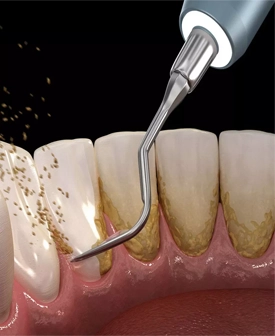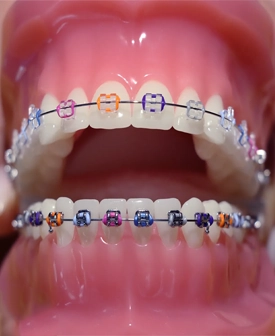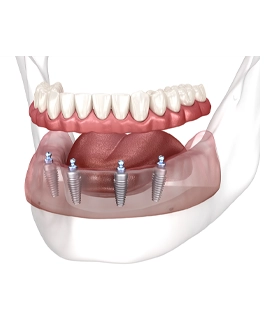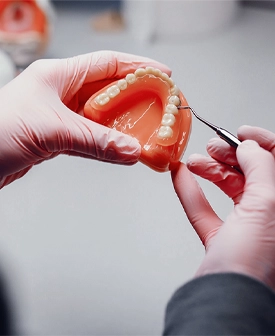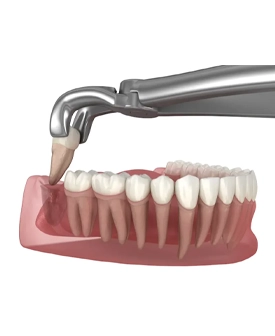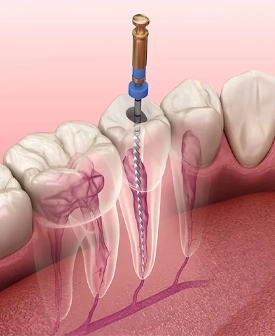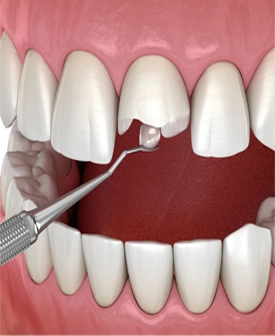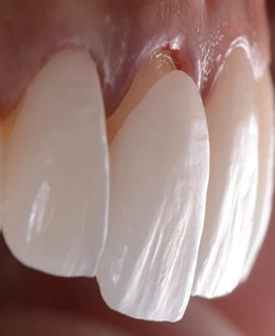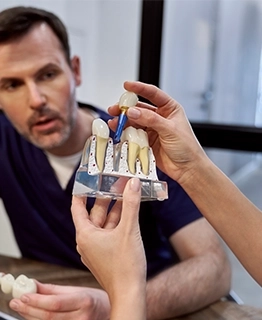Implant Treatment
What is Implant Treatment?
Implant treatment is a modern dental solution that provides a permanent and aesthetic solution for one or more missing teeth by placing artificial tooth roots into the jawbone. These artificial roots are made from biocompatible materials such as titanium and integrate with the jawbone over time, forming a solid structure. Prosthetic teeth made from materials such as porcelain or zirconium, which are placed on top of the implants, provide a natural appearance and function almost identical to natural teeth.
Stages of Imlant Treatment:
1. Examination and Planning:
The dentist evaluates the patient's oral and jaw structure, and performs X-rays and tomography.
A treatment plan is created, and the areas where the implants will be placed are determined.
2. Implant Placement:
Under local anesthesia, implants are placed into the jawbone.
The implant is left to integrate with the bone (osseointegration), which typically takes between 2 to 4 months.
3. Placement of Healing Caps:
Healing caps are placed on the implant to ensure the proper healing of the gums.
4. Prosthetic Creation:
After the healing caps are removed, abutments (connector pieces) are placed on the implant, onto which the prosthetic teeth will be attached.
Impressions are taken, and personalized prosthetic teeth are created in the laboratory.
5. Prosthetic Placement:
The prepared prosthetic teeth are securely fixed onto the abutments.
Advantages of Implant Treatment:
🔹 Provides the closest appearance and function to natural teeth.
🔹 Prevents jawbone resorption.
🔹 Does not damage adjacent teeth.
🔹 A long-lasting and permanent solution.
Who is Implant Treatment Suitable For?
Implant treatment is suitable for most individuals who are in good overall health, practice proper oral hygiene, and have sufficient bone volume. However, careful evaluation is necessary in the following situations:
● Uncontrolled diabetes
● Severe bone loss (osteoporosis)
● Heavy smoking and alcohol consumption
● Advanced age with systemic diseases
In some cases, implant treatment can be made possible with bone grafts (bone powder).
Post-Implant Care:
- Implants should be regularly brushed and flossed just like natural teeth.
- Regular dental check-ups are necessary.
- Avoid hard foods and teeth grinding.
Is Implant Treatment Painful?
One of the most common concerns patients have is whether implant treatment causes pain. Generally, the pain experienced during and after implant treatment is minimal due to modern anesthesia techniques and pain relievers.
Pain During the Procedure:
Local Anesthesia:
🔹 Implant treatment is usually performed under local anesthesia, which means the area being treated is numbed, and the patient does not feel any pain.
🔹 Local anesthesia ensures the patient remains completely comfortable during the procedure.
Sedation Anesthesia:
🔹 In rare cases, or depending on the patient's condition, sedation anesthesia may also be preferred. In this case, the patient will be completely asleep during the procedure and will not feel anything.
Pain After the Procedure:
Mild Discomfort:
🔹 After the effect of the anesthesia wears off, patients may experience mild pain, swelling, and discomfort.
🔹 These symptoms usually decrease within 2-3 days and can be managed with prescribed painkillers.
Pain Management:
🔹 The dentist may suggest cold compresses, a soft food diet, and pain relievers to manage discomfort.
Tips to Reduce Pain:
Medication Usage:
🔹 Take the painkillers prescribed by your dentist as directed.
Cold Compress:
🔹 Apply a cold compress to the treated area.
Diet:
🔹 Eat soft and liquid foods for the first few days.
Oral Hygiene:
🔹 Pay attention to oral hygiene and use mouthwash as recommended by your dentist.
Smoking and Alcohol:
🔹 Avoid smoking and alcohol consumption.
Rest:
🔹 Make sure to rest and avoid strenuous activities.
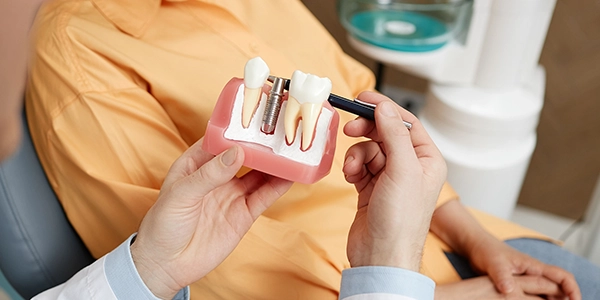
How Long Does Implant Treatment Take?
The duration of implant treatment can vary depending on several factors. Generally, this treatment is completed in several stages, and the total duration can range from 3 to 9 months. Here are the stages of implant treatment and their estimated durations:
1. Examination and Planning (First Session):
- During this session, your dentist examines your teeth, takes X-rays, and determines the areas where implants will be placed.
- A treatment plan is created, and the position for the implant is decided.
- This session typically lasts about 1 hour.
2. Implant Placement (Second Session):
- In this session, under local anesthesia, the implants are placed into the jawbone.
- Depending on the number of implants and jaw structure, this session can take between 1 to 2 hours.
3. Healing Process (Osseointegration):
- The implant needs to integrate with the jawbone, which takes about 3 to 6 months.
- During this process, the bone grows around the implant, stabilizing it.
4. Healing Abutments Placement (Third Session):
- Once healing is complete, healing abutments are placed on the implant.
- These abutments allow the gums to heal and form an appropriate socket for the prosthesis.
- This session typically lasts around 30 minutes.
5. Prosthesis Creation and Placement (Fourth and Fifth Sessions):
- The healing abutments are removed, and abutments are placed on the implants, which will support the prosthetic teeth.
- Impressions are taken, and custom-made prosthetic teeth are prepared in the laboratory.
- The prepared prosthetic teeth are fixed onto the abutments.
- These sessions can last between 1 to 2 hours, depending on the type and number of prosthetic teeth.
Factors Affecting the Treatment Duration:
Bone Density:
- In patients with insufficient bone density, bone grafting may be necessary, which can extend the treatment time.
Number of Implants:
- Placing more implants can increase the procedure time and extend the healing process.
General Health of the Patient:
- Certain health conditions (such as diabetes) may affect the healing process, potentially lengthening the overall treatment duration.
4. Healing Process:
- Each patient's healing process is different, and this can also influence the treatment time.
In summary, implant treatment typically takes between 3 to 9 months. However, the treatment time can vary from patient to patient, depending on their individual circumstances.
Factors Affecting the Cost of Implant Treatment:
1. Implant Brand and Material:
- The brand and quality of the implant directly affect its price.
- Biocompatible and durable materials like titanium increase the cost.
2. Number of Implants:
- The more implants placed, the higher the total cost.
3. Additional Treatments:
- Procedures such as bone grafting or sinus lifting may be necessary, which can increase the overall cost.
- Treating existing issues like gum disease can also add to the cost.
4. Type of Prosthesis:
- The type and quality of the prosthesis (porcelain, zirconium, etc.) placed on the implant affect the price.
5. Experience of the Clinic and Doctor:
- The experience of the clinic and dentist, as well as the quality of materials and technology used, can influence the price.
6. Location:
- The location of the treatment, whether it's in a city or a specific clinic, can also affect the cost.
Value of the Cost:
Longevity:
- With proper care, implants can last a lifetime. This can make them more cost-effective in the long run compared to other prosthetic options.
Comfort and Function:
- Implants provide comfort and functionality closest to natural teeth. Chewing and speaking functions are restored just like natural teeth.
Aesthetic Appearance:
- Implants offer a very similar appearance to natural teeth, enhancing confidence and improving quality of life.
Jawbone Health:
- Implants prevent bone loss in the jaw and help maintain facial structure.
Conclusion:
Implant treatment provides the most effective solution for replacing missing teeth in terms of aesthetics and functionality. For patients seeking a long-lasting, safe, and natural solution, implants are among the most preferred treatment methods today. It's important to consult a dentist for more detailed information about implant treatment.


